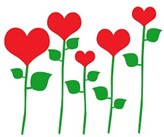
As Dr. Les Carter often reminds us (https://tinyurl.com/4dd69f4c), “stating the obvious, something is not right inside narcissists. For perspective, remember that we humans are hard-wired for relationships, for love and connection. Literally from Day One we seek out those who can become our safe harbor, and we find contentment as that effort succeeds. Essentials like trust, empathy, and psychological well-being can flourish when properly nurtured. As you consider the traits of narcissism, you can easily wonder: What went wrong? Instead of fostering safety, many traits interfered with healthy relationship development”.
Bearing the above in mind, Bambi was happy when she learned that there is a full day devoted to raising awareness about narcissistic abuse since 2016. It is the “World Narcissitic Abuse Awareness Day” and is highlighted on June 1st. As well stated on its website (https://tinyurl.com/4rcznmwj): “unlike physical abuse, narcissistic abuse leaves no physical marks. A form of psychological and emotional abuse, narcissistic abuse is invisible and difficult to prove. Yet, its effects are lasting and harmful”.
One must keep in mind that narcissism is a personality style, to cite Dr. Ramani Durvasula. Like any personality style, it exists on a spectrum. Of course, not all emotional abusers have narcissistic traits or are narcissists (with a disorder of kind of inflated grandiosity and self-esteem, https://tinyurl.com/eate5u2x), as we learn from Dr. David Hawkins’ 40 plus year-long practice. However, all narcissists resort to emotional abuse.
To conclude this post, Bambi will first borrow the beautiful epigraph in Dr. Darren Magee’s book, “Surviving Other People’s Self-Esteem: The Lengths Some People Go to Just to Feel Better Than Others”. The epigraph goes likes this: “Life is ten percent what happens to us, and ninety percent how we react to it.” – Dennis P. Kimbro. Second, she will end with the late Ms. Eleanor Roosevelt’s famous saying “No one can make you feel inferior without your consent“. Self-education is key for empowerment, healing, and personal growth.
Luckily for all of us, in this day and age, we have fast, free access to several resources on narcissistic abuse. This can empower and support those of us who are moving away from toxic relationship. It can also teach some of us tips of self-protection, even when “no contact” is not possible or wanted (e.g., a family member, a co-parent, a boss, etc.). Most importantly, it may also help us avoid potential narcissists in the future (learning about red flags and trusting one’s intuition). Of course, if anyone is in danger (i.e, risk of physical harm), he/she should get immediate help.

